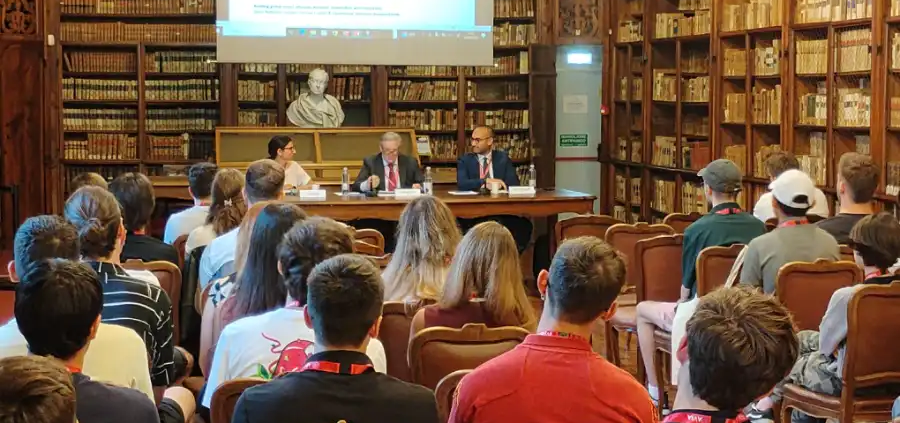Toward a United States of Europe?
Toine Manders delivered a guest lecture at the University of Pavia on Monday, September 15. The lecture focused on the EU’s Internal Market and its competitive position. He shared valuable insights on European policy for sustainable and competitive businesses and the crucial role of the European Parliament.
Introduction
My name is Antonius “Toine” Manders, and I was elected to the European Parliament in 1999. Before my political career, I was a successful designer. As they say, when a man becomes financially successful, he either buys a motorbike or starts a relationship with a younger woman. After a serious motorbike accident, I decided to study law and start my own law firm. I used practical examples from my legal practice to improve the internal market as an MEP.
Thirty years later, there’s still much work to be done. I believe the internal market should create a “level playing field” based on maximum harmonization of legislation. That’s why I always proposed converting directives into regulations, which led one journalist to call me the “arch defender of the internal market.” I received little support from my colleagues, who seemed to prefer over-regulating our economy.
The European Challenge: Decadence and Competitiveness
The European Union has the potential to lead a sustainable and competitive economy. But the question is, are we still capable?
In his farewell speech, the former CEO of ASML said it’s becoming increasingly difficult to run a business in Europe because Europeans are “too fat, too lazy, or too stupid.” Italian Prime Minister Giorgia Meloni aptly summarized it: “America innovates, China duplicates, and Europe regulates.”
These statements point to a worrying trend: we are living in a decadent period. A family anecdote illustrates this perfectly: my son, who has three master’s degrees, works four days a week at a bank. During his job interview for a secretary-general position, he stated he never works on Fridays because that’s when he takes care of his children. Only a motivated football team can win a match and a competition. What does this mean for Europe’s competitiveness?
Competitiveness: America vs. China vs. Europe
Let’s take a closer look at the three global players:
- America: The focus is on innovation, venture capital, and the rapid commercialization of new technologies. Most major tech companies are from the U.S., and Europe is completely dependent on companies like Google and Apple.
- China: Their competitive advantage lies in their immense scale and rapid, state-backed adoption of technology. This often happens with state aid and less stringent regulations. I visited China in June and felt like I was living in the future.
- Europe: We deal with the interests of 27 member states. Sometimes I feel the EU is a “golden cage”; once you’re in, you never want to leave. The people are intelligent and, due to high salaries, stay until retirement. But after 30 years, they are no longer “streetwise.” The result is an emphasis on regulation, such as the Green Deal and social standards, which are often too bureaucratic and slow down technological progress.
It’s a challenge for Europe to find a balance between regulation and innovation to maintain and strengthen its competitive position. If we have a strong economy, we can afford to spend money on climate and social issues.
The Draghi Report: A Potential Solution?
Does the 2024 Draghi Report, “The Future of EU Competitiveness,” offer a solution? The European Commission considers this report a roadmap for the future of the European economy.
- “Radical Change”: Draghi emphasizes that Europe can’t continue on its current path and that fundamental changes are needed to remain competitive. This includes addressing the fragmentation of the internal market, increasing investments in crucial sectors, and easing complex regulations.
- Strategic Autonomy: Draghi advocates for more European sovereignty in strategic areas like energy, technology, and defense. How is it possible that we force ourselves to move away from fossil fuels while importing them from the U.S. and Qatar?
- Sustainability as an Opportunity: Draghi sees sustainability not as a hindrance but as an opportunity for innovation and growth. The transition to a green economy can create new markets and jobs. But, as the saying goes, you can’t throw away your old shoes before you have new ones.
The Draghi Report is more than a list of policy recommendations; it’s a reality check. Draghi’s central message is that Europe’s relative economic decline is not just a trend but an existential threat. He stresses that Europe must shift its mindset from managing decline to proactively pursuing a new era of growth. This requires a “big push” of coordinated policy and a substantial, centrally financed investment plan to close the massive gap with competitors.
The report’s call for more joint decision-making and a “28th regime” to bypass fragmented national rules highlights the need for a fundamental shift in governance to avoid getting stuck in bureaucratic mires.
The European Parliament, as a co-legislator, has an important role to play in shaping policy based on these recommendations. During the last mandate, Parliament had a more left-leaning majority, which led to the adoption of legislation such as the Green Deal.
Following the Draghi Report and the 2024 elections, the new Commission tried to simplify legislation like the CSRD and CSDDD. The recent elections have resulted in a Parliament with more right-leaning politicians who are focusing on a stronger, more competitive Europe with attention to both economic growth and social and environmental aspects.
Conclusion: Toward a United States of Europe?
Europe is still a powerful economy, but we are dealing with the “law of the handicap of a head start” and disruptive innovation.
During the State of the Union address, President von der Leyen repeatedly mentioned, “if the member states will support.”
After years of serving in the European Parliament, it is clear to me that the only way to achieve a competitive Europe is to reform the EU treaties and start the United States of Europe.



